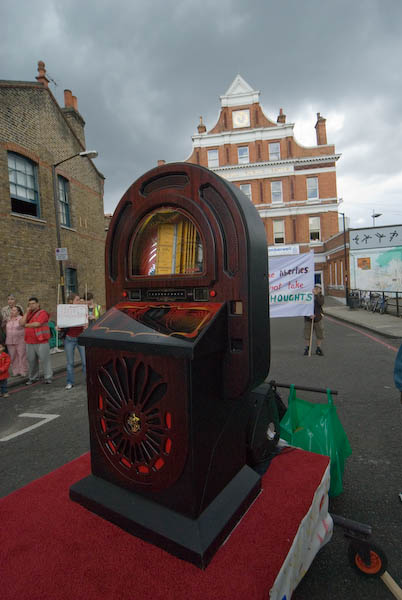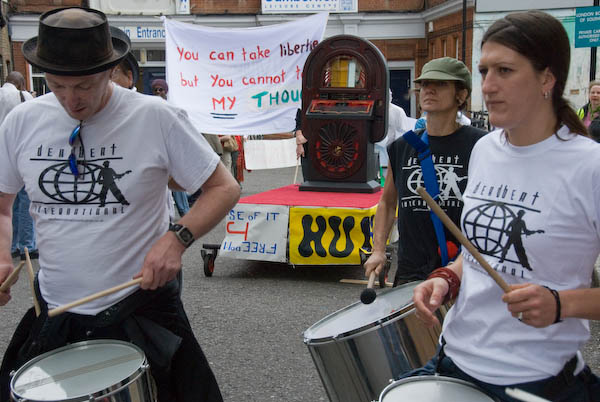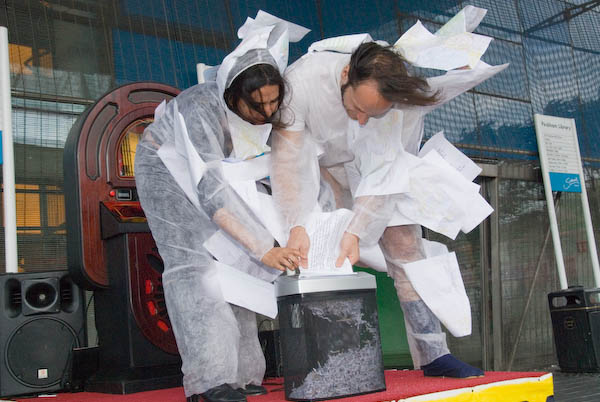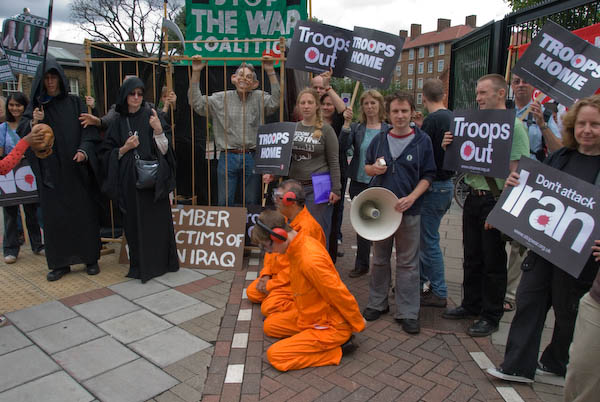It was in the 1960s that I joined the National Council for Civil Liberties – now known simply as ‘Liberty‘, after seeing the way that travellers were being hounded by the police, giving up time to help prevent their eviction from otherwise unused derelict sites that had been flattened in the massive redevelopments then taking place in Manchester’s inner suburbs.
Over recent years I’ve photographed many events related to civil rights and human rights abuse in this country, as well as continuing to support ‘Liberty’ and also friends who have taken practical action to support people who our government have been denied both any benefits from the state and the right to work, leaving them destitute.
Saturday I’d hoped to see a performance by Mark McGowan, burning an effigy of Margaret Hodge as a protest against her statement that established British residents should be given precedence over economic migrants for council housing. But there were no traces of a fire on Camberwell Green at noon. Perhaps, as in Birmingham earlier this year, it had been prevented on health & safety grounds. I only hope the guys will be out stopping such things happening on November 5!
Instead I joined the ‘Human Rights Jukebox‘ in its progress from the Camberwell Magistrates Court to Peckham, another event in the Camberwell Arts Week. The ‘March of the Human Rights Jukebox’ was organised by Isa Suarez, who had a one-year artists residency in Southwark in 2006. The juke box included thoughts on people’s rights from many residents and diverse groups in Southwark, some of whom marched with banners along with it.

At the start of the event, the Dulwich Choral Society performed a specially composed piece by Suarez, including words from the ‘Jukebox’. On Clerkenwell Green we stopped for a impassioned recital (in French) by a black African poet, and in front of the old baths in Artichoke Place (now the Leisure Centre) there was a long performance by the band Deadbeat International as well as a short song by three musicians that left us wanting more. Deadbeat International also performed at various other points on route, including another energetic set at Peckham library. The march was led into peckham by a rapper, with some forthright views on human rights.

Accompanying the jukebox were the live art group ‘mmmmmm‘, Adrian Fisher & Luna Montengro, covered from head to foot in sheets of paper containing the complete text of the UN Universal Declaration of Human Rights, in both English and Spanish as well as the pages of a world atlas.

Article 11 of the UN Human Rights Declaration hits the shredder.
In front of the library at Peckham, mmmmm completed the event by unpinning the sheets from each other one by one, reading the clauses and feeding the sheets into a shredder (and when this gave up, tearing them up.) Each then poured cold water over the other and threw the shredded papers, so that they stuck to the wet clothes and skin. Finally we were all invited (in what we were informed was an Argentine custom) to jump once into the air for each of the 30 clauses of the Declaration.

On the way to the event, I’d jumped off the bus at the Oval, where ‘Stop the War’ and other demonstrators were protesting. Gordon Brown was apparently expected to arrive at 12.00 to watch some kind of game there. It was a very different kind of action to the ‘jukebox’ though both were political and art in their different ways, although only one gets arts council funding.
The Human Rights Jukebox was more cultural than political, involving the participation of various marginalised groups, including migrants and those who have suffered from mental illness (and artists who are too in some ways marginalised.) Of course the cultural is political as I’ve long argued, and, for example, we need a huge cultural shift to make any effective action on climate change possible. The imagery of the ‘Stop the War’ demo is stereotyped and so familiar that it is perhaps hard to see it changing any minds, and a more creative approach might be more effective.
I’m a supporter of ‘Stop the War’ and have been on many demonstrations. It’s hard to stomach that we had the overwhelming majority of the British people behind us, organised the largest demonstration the country has ever seen but failed to influence events. Perhaps the underlying reason was that the leadership failed to think creatively and call for decisive action when it was needed.
Peckham has a bad reputation, and at times deserves it, but in many ways it is a vibrant place and interesting things happen there and just along the road in Camberwell. You can see more pictures of the March of the Human Rights Jukebox, as well as a few of the Oval demo, and some great kids on their bikes from track in Burgess Park who called in at Peckham Library while I was there on My London Diary.